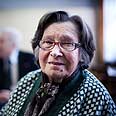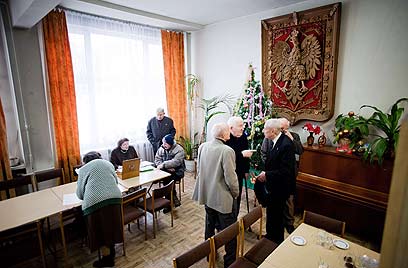
Children of Auschwitz recall liberation 65 years on
Ahead of ceremonies marking anniversary of Nazi death camp liberation, Polish survivors say they will forever remain children of Auschwitz
When she was only 11, Wasiak spent six months in Nazi Germany's largest and most infamous World War II death camp, barely surviving on "a slop of water and rye flour".
Severely malnourished, she became gravely ill but believes this may have saved her life.
Today, as treasurer of an Auschwitz-Birkenau survivors' association in Warsaw, she meets regularly with a dwindling number of members, many of whom shared her fate like 78-year-old Stanislaw Przeradski.
"After living five years in Warsaw under the Nazis we were no longer children when we came to Auschwitz," said Przeradksi, who was only 13 at the time.
"We'd seen it all - firing squads shooting innocents in the street, brutality, air raids," he told AFP.
All told, around 232,000 children were held prisoner in Auschwitz, including 216,000 Jews, 11,000 Roma, 3,000 Poles and the rest from Russia, Ukraine and elsewhere, according to Auschwitz-Birkenau museum historians.
Part of Nazi dictator Adolf Hitler's plan of genocide against European Jews, dubbed the "Final Solution", Auschwitz-Birkenau operated in the occupied southern Polish town of Oswiecim between June 1940 and January 1945.
Of the more than 1.3 million people imprisoned there, some 1.1 million - mainly European Jews - perished, either asphyxiated in the gas chambers or claimed by starvation, exhaustion and disease.
In all, the Nazis killed six million of pre-war Europe's 11 million Jews.

Auschwitz association suvivors meet in Warsaw (Photo: AFP)
Both Wasiak and Przeradski were shipped to Auschwitz in August 1944, among thousands of non-Jewish Polish civilians the Nazis drove out of Warsaw after Polish partisans launched the Warsaw Uprising, a bloody and doomed assault on the city's Nazis occupiers.
Between 1940-45, half of the death camp's estimated 140,000 to 150,000 non-Jewish Polish prisoners died behind its barbed-wire. Thousands sent to other Nazi camps also perished, according to the museum's records.
On January 17, 1945, 10 days before the Soviet Red Army liberated the camp, the Nazis forced some 60,000 prisoners into the notorious "Death March" to the dozens of Auschwitz sub-camps.
"I was too weak to go," said Wasiak. She was one of some 7,000 people left to die.
She remembers a Soviet reconnaissance unit entering the camp a day or two before January 27, when the arrival of the Red Army front marked the camp's liberation.
"They were very ragged, very hungry," she told AFP at one of the regular meetings of Auschwitz survivors in a drab communist-era community centre in Warsaw's working-class Wola district.
"The troops set up a field kitchen in front of our children's barrack. They were eating horse meat and we, like dogs, begged them to give us a little and they 'played' with us, throwing the bones into the snow. We fetched them and chewed them," Wasiak said, choking back tears.
Freezing and starving, she searched for discarded clothes near the infamous crematoria and rummaged for food. She was among 30 children led out of the camp by a Polish woman survivor.
"It was bitterly cold, corpses were jutting out of the snow on the ground. People who fell behind on the 'Death March' were shot -- we tripped over their corpses," she said, staring blankly.
Still painful
Tall and thin, with penetrating blue eyes, Jan Kazimierz Bokus, at 90, is the association's oldest surviving founding member.
"At the beginning, in 1946, there were over 2,000 of us and we are just 200 -- we have terribly high mortality," he said.
"There are few survivors my age...today most member are the children of Auschwitz, babies who were still in their mother's womb or born at the camp."
Sipping tea, Leokadia Rowinska, recalls how she spent her first wedding anniversary at Auschwitz.
"I was three months pregnant," said the 86-year-old, also sent from Warsaw in August 1944.
Five months later on January 17, heavily pregnant, she was among other expectant mothers forced into the "Death March".
Her contractions came as the first rumblings of the advancing Soviet front could be heard from the east. She was ordered to stay on a German-owned farm in Poreba, a town 56 kilometres (35 miles) north of Auschwitz. As she cried out in the pain of childbirth, Nazi guards told her to shut up or be shot.
Rowinska gave birth to a boy on January 21. She named him Ireneusz. But starving, the 20-year-old had no milk to suckle her infant and he lived only eight days.
"It was so long ago, but it's painful," she said, overcome by emotion.
By February 1, a Soviet reconnaissance unit arrived in Poreba. "They told us we were free," Rowinska says dismissively.
Upon her return, she found Warsaw destroyed, but her husband and mother alive.
"Last August, I found my son's resting place. I'll visit it soon, he would have been 65 this month."










